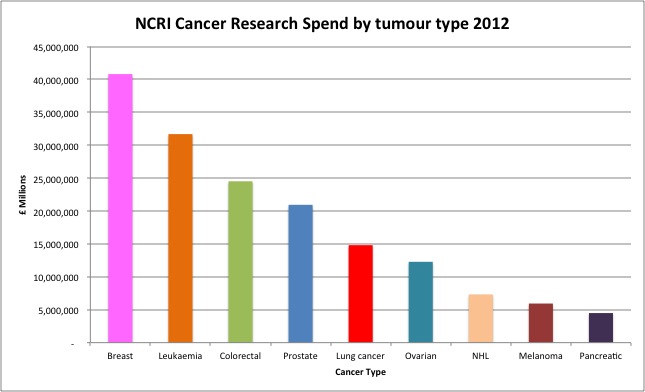Research funding for pancreatic cancer down by 13%
Research funding for pancreatic cancer has fallen by nearly 13 per cent despite no significant improvement in the 3% five-year survival rate for the UK’s fifth biggest cancer killer, according to national charity, Pancreatic Cancer Action.

Pancreatic Cancer Action has released updated statistics on pancreatic cancer which show that despite the disease having one of the worst five year survival rates of all cancers, and the fact that it is the fifth leading cause of cancer death in the UK, research funding from the National Cancer Research Institute into pancreatic cancer has actually fallen by nearly 13 per cent in the past year.
Pancreatic Cancer Action’s comprehensive statistics pack also highlights the fact that five year survival rates for pancreatic cancer in the USA, Canada and Australia are double those in the UK and that the UK has one of the worst one-year survival rates in Europe.
Variation is also found in one and five-year survival between UK Cancer Networks with some networks having rates double that of others. Poor one-year survival rates are generally taken to be an indicator of more advanced disease at diagnosis, which is reflected in the fact that 50 per cent of cases present as an emergency.
The statistics packs also include the latest epidemiological data on the disease including a recent UK study which identifies that smoking accounts for nearly one third of UK cases and that risk is increased for those who are obese, those who have chronic pancreatitis, for those with diabetes and for those with a family history of pancreatic cancer.
Ali Stunt, Founder and Chief Executive of Pancreatic Cancer Action said, “ There has been decades of underfunding for pancreatic cancer and to see that research funding for the disease has fallen despite a clear need for it to increase is hugely disappointing. When we look at other cancers such as breast, colorectal, leukaemia and prostate for example, we see a direct correlation between the levels of investment in those diseases and the corresponding improvement in their five year survival rates over the past 30 years. Relative to its disease burden, pancreatic cancer is owed far more than the current 0.9 per cent share of overall research funding it receives if we are to see any significant improvement in survival.”
The statistics pack includes data on pancreatic cancer incidence and mortality plus one, five and ten year survival rates, comparisons of one-year survival against other European countries and between Cancer Networks in England. Included are five-year survival comparisons between different cancers and a look at funding inequalities facing pancreatic cancer versus other common cancers and some not-so-common cancers.
What do the data tell you?
Overall, there has been an increase year on year of pancreatic cancer incidence in the UK to 2010. Incidence stands at 8455 cases in 2010 and there were 7921 deaths in the same year. While incidence has been going up, the age-standardised incidence rate (rate per 100,000 people, standardised to the European population) has remained fairly constant at around 9.0 since 1993.
Sadly, five-year survival rates have remained the same as they have been for over forty years – at just over three per cent. Although there has been an encouraging rise in one-year survival rates in both England, Wales and Scotland since the late 1990’s, the rise has been modest with figures still below 20 per cent. One-year survival rates in Northern Ireland have changed little and are still below 15 per cent.
Pancreatic cancer research continues to be severely underfunded and, despite it being the fifth leading cause of cancer death in the UK, pancreatic cancer still receives less than one per cent of overall research funding.